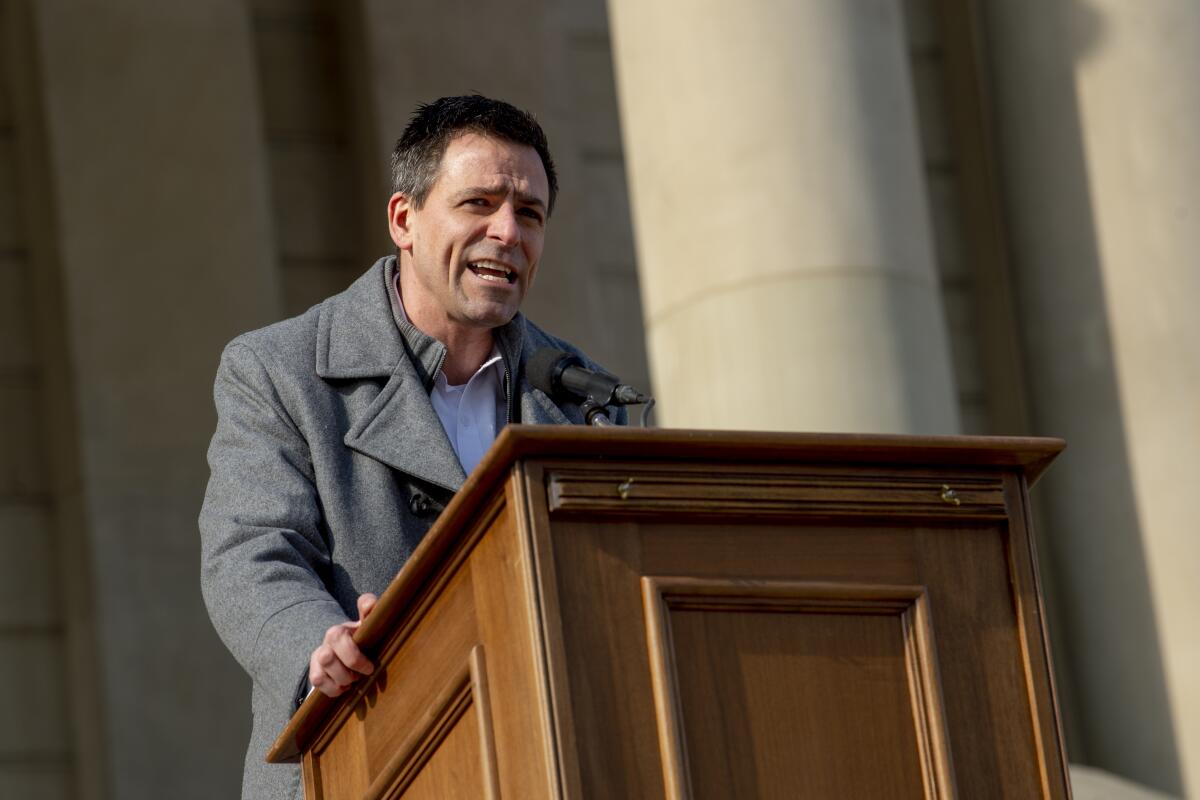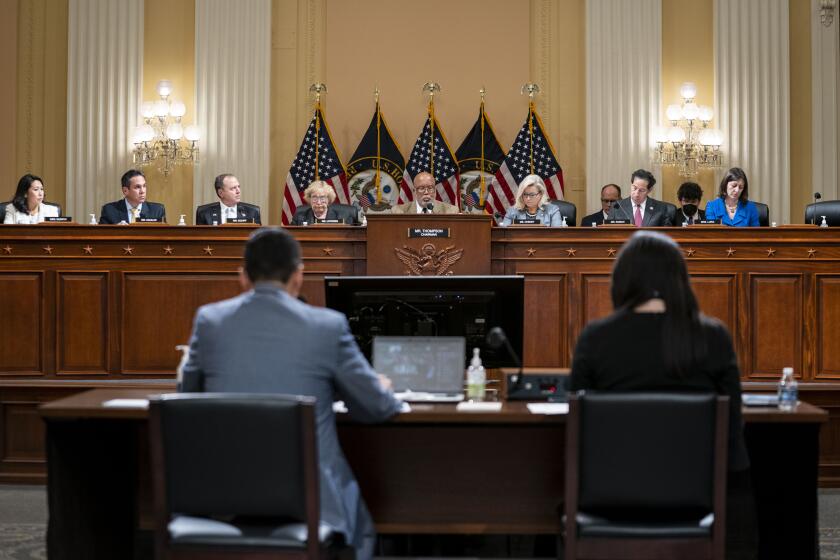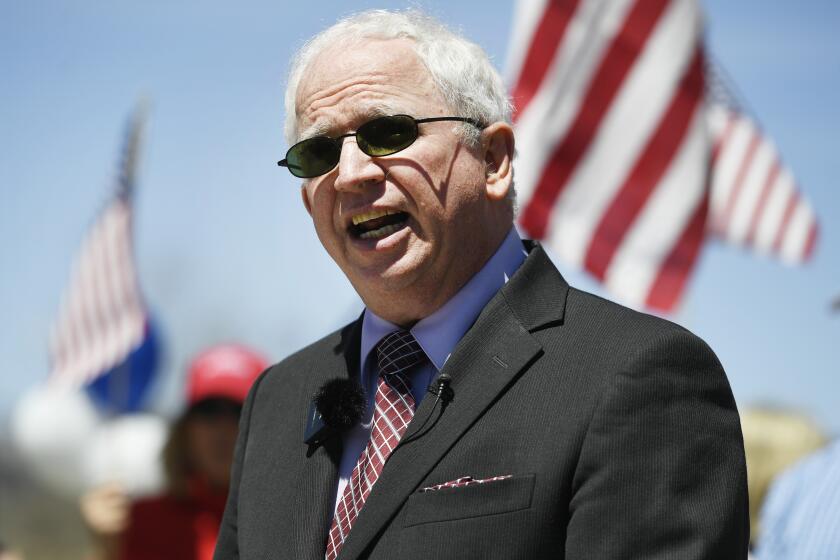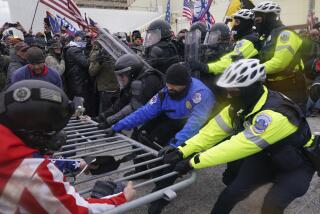Michigan GOP hopeful Ryan Kelley charged in Jan. 6 riot, roiling primary

- Share via
GRAND RAPIDS, Mich. — A Republican candidate for Michigan governor and ardent defender of former President Trump was charged with misdemeanors Thursday for his role in the 2021 postelection riot at the U.S. Capitol, further complicating an already messy GOP primary.
Ryan Kelley, 40, was arrested in western Michigan, FBI spokeswoman Mara Schneider said. He appeared at a brief hearing Thursday afternoon in federal court in Grand Rapids, where he was released from custody without posting bail. The government did not ask that Kelley be detained.
His arrest came hours before the House committee investigating the insurrection holds a widely anticipated public hearing, showing never-seen video, audio and an array of evidence highlighting the deadly violence that erupted on Jan. 6, 2021.
There was no immediate comment from Kelley’s campaign, other than a post on his Facebook page that stated only “political prisoner.”
Kelley’s arrest further roils a GOP field that initially had 10 candidates seeking to challenge Democratic Gov. Gretchen Whitmer in the battleground state this fall. Five of them, including two front-runners, were dropped from the primary ballot because forged signatures submitted by paid petition circulators left them below the 15,000 needed to make the race.
The four other Republicans in the race are conservative commentator Tudor Dixon, who recently was endorsed by the family of former Trump administration Education Secretary Betsy DeVos, businessman Kevin Rinke, pastor Ralph Rebandt and chiropractor Garrett Soldano. Trump has not endorsed anyone in the race.
A series of congressional hearings about the Jan. 6, 2021, attack on the U.S. Capitol have been televised. Here’s what you need to know.
Kelley, a real estate broker who lives in Allendale Township, is accused of disruptive conduct, injuring public property and entering restricted space without permission, according to the criminal complaint.
In a court document made public Thursday, federal investigators said Kelley was recorded on video outside the U.S. Capitol on the day of the insurrection, repeatedly waving to the crowd and directing them toward stairs leading into the building. He used his phone to “film the crowd assaulting and pushing past U.S. Capitol police officers” and was in a crowd that climbed stairs to a Capitol entrance after causing police to retreat, the FBI said.
The document included multiple photos of Kelley that the FBI described as screengrabs from video taken that day, with Kelley wearing aviator sunglasses and a baseball cap worn backward, trying to rally the pro-Trump crowd.
Kelley has long acknowledged that he was at the insurrection and said that he didn’t go inside the Capitol. It wasn’t clear why authorities decided to move against Kelley now. But nearly 18 months later, the government continues to charge more people in the massive investigation.
The committee investigating the Jan. 6, 2021, Capitol insurrection will begin presenting its evidence to the American public in primetime on Thursday.
He is among more than 800 people who are facing criminal charges in connection with the Jan. 6 riot. More than 300 people have pleaded guilty, largely to misdemeanor offenses punishable by no more than one year in prison. Some who’ve pleaded guilty to misdemeanors have been sentenced to short stints behind bars while others have been sentenced to home confinement or probation.
Kelley became a vocal activist in Michigan during the COVID pandemic, when he protested restrictions put in place by Whitmer. During the early months of the pandemic, he organized a protest at the Michigan Capitol, inviting heavily armed militias to gather inside the statehouse.
He has told the Associated Press that militia members are “law-abiding, lawful citizens that love this country, and maybe you get a couple of them that are bad apples. Question for you is, are bad apples pretty much in everything that we have as far as groups?”
Federal Judge David O. Carter orders Trump lawyer John Eastman to give 159 more emails to the House committee investigating the Jan. 6 Capitol attack.
Kelley also has made election fraud and the lie that Trump won the election a major focus of his activism and his campaign for governor. After the 2020 election, Kelley was a speaker at a “Stop the Steal” rally in Lansing, telling the crowd that Democrats were trying to steal Trump’s victory. As a candidate, Kelley said that if elected governor, he would work to cancel contracts with companies that provide voting machines in Michigan and eliminate same-day voter registration.
Last week, Kelley declined to participate in a Republican debate because organizers of the public policy conference on Mackinac Island required proof of a COVID-19 vaccination or a negative test. He encouraged his fellow candidates to do the same.
Michigan Democrats criticized the GOP field on Thursday as pushing “lies and extremism,” and said Kelley has “no business seeking an elected position in the same government he tried to overthrow.”
More to Read
Get the L.A. Times Politics newsletter
Deeply reported insights into legislation, politics and policy from Sacramento, Washington and beyond. In your inbox twice per week.
You may occasionally receive promotional content from the Los Angeles Times.













